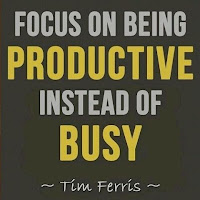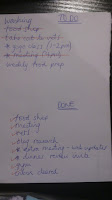Anyone noticed the
mornings are starting to get a little lighter and the evenings stay lighter
longer now? Yep, we are slowly but
surely creeping out of January! So congratulate yourselves on getting through
officially the darkest 10 weeks of the year!
To celebrate we have been shaking things up a little this week and
tackling the dreaded TO DO list that always seems a little longer in January! We have taken on the TO DO’s in a new fashion
– and its working – so this week we wanted to show you how:
1.
Efficiency and time monitoring
We’ve reached a
ground breaking 16 page to do list. That’s bad.
So instead of scratching our heads at the end of each day wondering
where the time went and how we can be so utterly good at procrastinating (and
perhaps if there is a future career in that?) we figured it was time to refocus
and try something different.
At the end of each
day my list was a little longer and only a few things were crossed out. Anyone with me on this so far? Looking back at a list with the check boxes checked, I do
find somehow motivating and satisfying and I know that’s not just me, BUT operating
this way clearly wasn’t working anymore, as my list got longer and no sooner
had I checked something off, I’d also added another 3 things! Still sounding familiar? Stress and a little panic slowly started
creeping in and I was wondering
- How come I felt so busy every day but didn’t seem to be getting anywhere
- How was my to do list just getting longer and more and more unmanageable?
And that’s the word
to focus on – management – it comes back to management of my time. (This is assuming the list was in good order in
the first place and I’d already managed my priorities).
- So how and why could we manage and monitor our time to efficiently complete ALL the tasks on the list?
Back in the day, I
used to work in PR and we charged our clients per campaign. To break the costs
down for them some clients wanted to see how much time, money and manpower we
threw into each campaign and when pitching new business we wanted to show how
we would assign our resources too. Time
monitoring was also great for senior management so they could see where their
employees time was used best, who was dragging and how to be more
EFFICIENT. If you know me, you know
efficient is my middle name
- So why was I not finding efficiency in my own daily tasks?
Well, to learn, I
monitored and managed my time and achievement of tasks each day – I literally
COSTED my TIME. It’s so simple.
Here is how simple – take
a blank time costing spreadsheet – one axis has the time, the other the day,
then fill in the blanks. We would literally note on it at the end of each day,
which client/project we spent each hour on and what task we were doing for
them.
|
|
MON
|
TUES
|
WED
|
THURS
|
FRI…etc
|
|
6
to 7
|
|
|
|
|
|
|
7
to 8
|
|
|
|
|
|
|
8
to 9…etc
|
|
|
|
|
|
Looking at a
spreadsheet like this once completed, we could (among other things)
- Total up the hours and invoice for them – literal time costs
- See who was spending too little or too much time on an individual client, project or task
- Manage our time ourselves to see where we could do better – ie what was taking longer than expected? What could be automated or delegated? (And of course we would struggle to remember what we were really doing for those last 2 hours of a Friday afternoon….?!)
So what’s that got to
do with our January to do list? Well, we
applied this to our daily lives for just one week. We imagined we were paying
someone to complete our to do lists looking at how efficient we would find
their sheets and where we would be asking questions. The outcome was seriously useful and quite a
shock. I can see where my time is spent,
needed, stretched, squandered and therefore what requires more attention, what
can be cut and where I can find more hours.
The key is after doing this I have found I can
be productive rather than busy.
If you are struggling
at all, or finding yourself at the end of the day with more to do than when you
started, I really recommend giving this a go.
*TIP – think of this
as opposite to a timetable. When
timetabling a day/week etc you fill the days up ahead of time and try keeping
to the schedule, but with this you go about your business as you normally would
just logging at the end of each day/week what you did and when. Seriously it’s a game changer and I wish I’d
thought to apply this to my own life earlier!
*NOTE - note if
you’re interested you can also monitor your online time these days. There are apps and trackers and all sorts so
writing “online research” is fooling no one if you use these too – you can
shock yourself with how much time you really spend on Facebook, Buzzfeed, Youtube….etc
https://www.rescuetime.com/ for example, or just Google “real time monitoring tools”
2.
To do? Or Done?
So we’ve found time
and that’s no mean feat let me tell you.
I really do feel like I have more hours in the day because I recognise
how I use my time. Everyone will be
different, for example I now know I exercise better in the morning and check Facebook more when I’m hungry – seriously, who knew? – but now this is all
worked out, the second thing we’ve tried in the bid to complete the mammoth to
do list is actually making another list – stay with me here:
Due to our perhaps
irrational love of lists we decided to make
a DONE list as well as a TO DO and
see how they compare. Best thing I
ever did. You see if you list what you
need to do at the start of the day it makes sense to me to list what I have actually
done at the end of the day. A list of accomplishments is like a little pat on
the back and that spurs me on. Practically
I can feel a sense of achievement and be proud of myself at the end of each day
as making this list and looking back over it, I appreciate all the other things
I complete each and every day that are not actually on my to do list! This stops me beating myself up over not
getting things done, when I can look at the DONE list and see that maybe I
didn’t do all I set out to do, but I did do all this other stuff that was just
as important, or maybe even more so as it interrupted my intentions.
For example:
With the done list
you can see there were interruptions, last minute invites and a gym session as
yoga class was cancelled as well as other bits and pieces. All of this is great and shows me that I
wasn’t procrastinating after all! I
still achieved a good work out, got some great research and prep done and snuck
in an extra meeting and review – the washing and food prep can still be done
tomorrow and the inbox is clear so I will definitely have the time. These tasks can and will roll over, yet I
still feel good about the day and not wasting any time.
I know some of you
will be reading this thinking just prioritise and don’t set yourself up for
failure by adding to much to your list in the first place – this is also
true. We looked into priorities and goal
setting at the stat of the year actually and you can read back over that blog
on SMARTER GOAL SETTING here: For me however, right now, if it’s not written down I WILL
forget it, so EVERYTHING goes on the to do list. If you are not like me and prefer to have a
small/short list then maybe you are better at setting priorities or better at
simply remembering – here are some extra tips for you:
3. One at a time
Finally, after
finding more hours with the time costing more motivation with the done list, I
made myself a promise to finish one
thing before starting another. Again
for some people this may be a simple but great thing to remember and stick
to. For others it’s good to flit between
a few bits and pieces so you dot get bored.
The flitting was what I was doing, but I’m changing it up, so I promise
I will not start a new task until I have completed the one
I’m working on.
And while I’m at it I will not make another cup of tea
until I’ve finished drinking the one I have!
Please share your
tips on how to GET THINGS DONE via the comments here or on Facebook and Twitter. Plus we would love to see your TO DO and DONE
lists. Some are so inspiring! You can share images via
For further blog
updates, follow us via the button on the right.
And finally for a
free consultation, further tips and tricks for getting things done or for any
further information, please email: info@nitakothari.com
**Please remember this is advice ONLY (as is all other
information contained in this blog, the website and social media related to it)
None of the info or advice is intended to override any recommendation from your
GP or health professional**








No comments:
Post a Comment